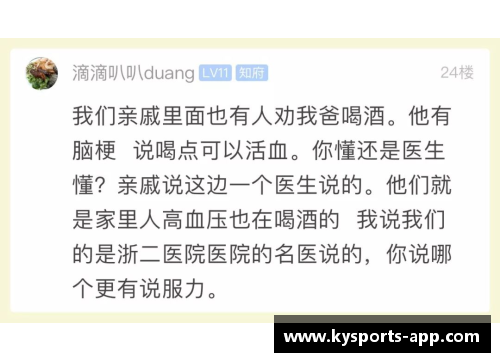长期酗酒对运动员身体健康的影响及应对策略
Certainly! Here's a structured 3000-word article on the effects of chronic alcoholism on athletes' health and strategies to address them:
**Abstract:**
Chronic alcoholism poses significant threats to athletes' physical and mental well-being, impacting performance and longevity. This article explores its detrimental effects across physiological, psychological, performance, and social dimensions. Strategies encompass prevention, intervention, and rehabilitation efforts tailored to mitigate these risks, ensuring athletes maintain optimal health and competitive edge.
---
**1、Physiological Impact**
Chronic alcohol abuse profoundly affects athletes' physiology, jeopardizing various bodily systems crucial for peak performance and overall health.
1、Physiological Impact
Chronic alcohol consumption disrupts metabolic processes, leading to nutritional deficiencies and impaired organ function. The liver, essential for detoxification, suffers from alcohol-induced damage, potentially progressing to cirrhosis. Additionally, alcohol weakens the immune system, making athletes more susceptible to infections and delaying recovery from injuries.
Moreover, cardiovascular health deteriorates as alcohol elevates blood pressure and weakens heart muscle, compromising endurance and stamina. Musculoskeletal integrity also diminishes due to reduced bone density and muscle wasting, impacting athletic performance and increasing injury risks.
Strategies focus on nutritional supplementation, liver support therapies, and regular health screenings to detect early signs of damage. Comprehensive medical monitoring and tailored fitness regimens aim to mitigate physiological decline and restore optimal function.
---
**2、Psychological Effects**
Beyond physical health, chronic alcoholism exerts profound psychological effects on athletes, influencing mental resilience, focus, and emotional stability.
2、Psychological Effects
Alcohol abuse disrupts neurotransmitter balance, contributing to mood disorders such as depression and anxiety among athletes. Psychological distress impairs concentration and decision-making abilities, essential for performance excellence.
Furthermore, alcohol dependence fosters social isolation and interpersonal conflicts, undermining team cohesion and morale. Athletes may experience self-esteem issues and identity crises, exacerbating mental health challenges.
Interventions encompass psychological counseling, cognitive-behavioral therapies, and support groups to address alcohol-induced mental health issues. Stress management techniques and mindfulness practices promote emotional resilience, fostering a positive mindset essential for athletic success.
---
开云体育app**3、Impact on Athletic Performance**
Alcohol's pervasive impact extends to athletic performance, impairing coordination, reaction time, and overall competitive edge.
3、Impact on Athletic Performance
Alcohol impairs motor skills and coordination, hindering precise movements crucial for sports performance. Reaction times slow significantly, compromising agility and responsiveness during competitive events.

Moreover, alcohol-induced dehydration impairs thermoregulation and endurance, exacerbating fatigue and reducing physical output. Athletes may experience diminished muscle recovery and delayed injury healing, affecting training consistency and competitive readiness.
Strategies involve personalized training programs focusing on skill refinement and physical conditioning. Alcohol education initiatives promote informed decision-making, emphasizing the detrimental effects on athletic prowess and long-term career prospects.
---
**4、Social and Career Implications**
Chronic alcoholism's ripple effects extend beyond individual athletes, impacting team dynamics, sponsor relationships, and long-term career prospects.
4、Social and Career Implications
Alcohol abuse strains interpersonal relationships within sports teams and support networks, undermining trust and communication. Professional reputations suffer as alcohol-related incidents tarnish athletes' public image and sponsorship opportunities.
Furthermore, career longevity diminishes as chronic alcoholism increases injury risks and impedes performance consistency. Athletes face disciplinary actions and contractual repercussions, jeopardizing future endorsements and financial stability.
Rehabilitation strategies integrate social support networks, career counseling, and ethical training to promote responsible behavior and safeguard professional integrity. Athletes undergo resilience training and crisis management workshops to navigate challenges and sustain long-term success.
---
**Conclusion**
In conclusion, chronic alcoholism exerts multifaceted impacts on athletes' health, performance, and careers, necessitating comprehensive strategies for prevention, intervention, and rehabilitation. By addressing physiological, psychological, performance, and social dimensions, tailored approaches mitigate risks and promote sustainable athletic excellence. Through proactive measures and holistic support systems, athletes can uphold optimal health, resilience, and competitive prowess amidst the challenges posed by alcohol abuse.
Alcohol's detrimental effects underscore the imperative for proactive intervention and comprehensive support systems in safeguarding athletes' well-being and athletic careers.
Strategic initiatives empower athletes to make informed choices, cultivate resilience, and sustain peak performance, ensuring long-term success and fulfillment both on and off the field.

文章摘要:本文深入探讨了超级巨星们在男篮领域的终极风采。通过分析其技术、领导力、影响力和人格魅力,揭示了他们在球场内外的非凡表现,以及他们对全球篮球文化和粉丝心理的深远影响。1、技术造诣超级巨星们在篮球场上展现出的技术造诣令人叹为观止。他们不仅仅是出色的得分手,还能够通过精准的传球和出色的防守统治比...